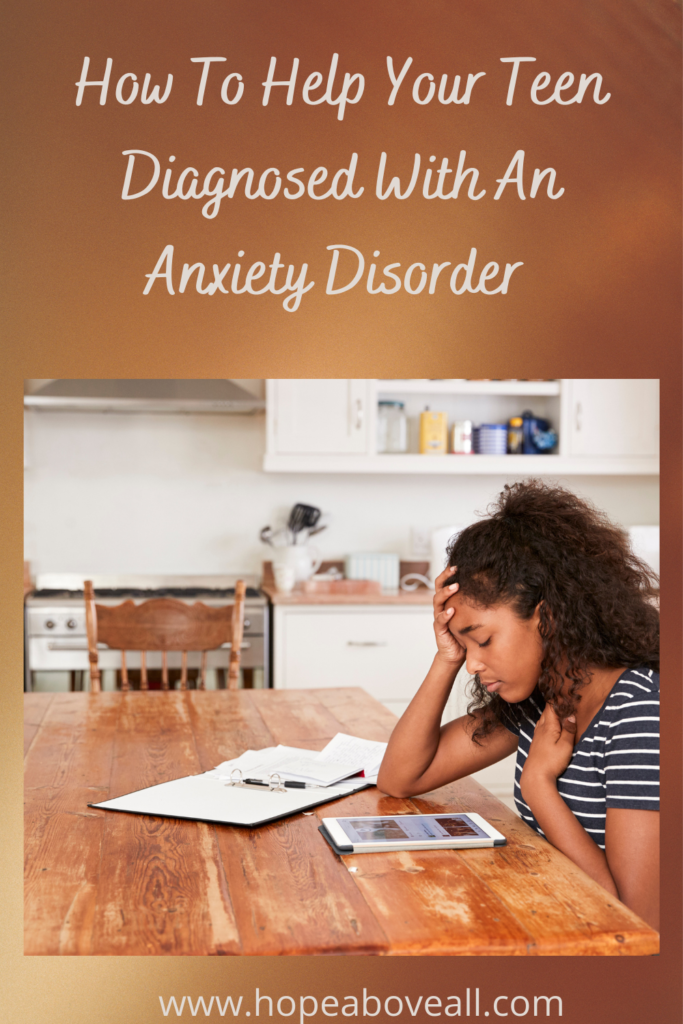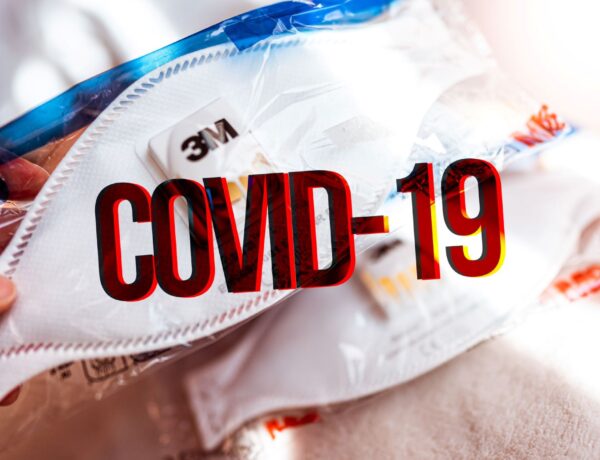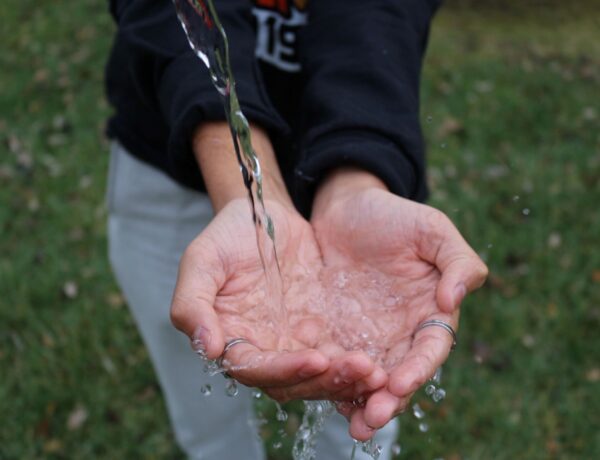Raising teenagers is hard work. Raising a teen diagnosed with an anxiety disorder and depression requires all hands on deck, all of the time. My daughter was diagnosed with depression a few years ago. This was a very challenging time for our family. We had to figure out how to help. We sought medical attention for our daughter, and with the help of her psychiatrist, therapist, and medication, her depression is now under control. It wasn’t an easy ride, and it didn’t happen overnight, but we patiently persevered to get to where we are today.
Unfortunately, just when we felt like we were in a good place, anxiety started rearing its ugly head. And as a result, things took a turn for the worse. The school environment was giving my daughter anxiety in epic proportions, so we had to decide how to help her with her academics and mental health, both of which are equally important. Consequently, she finished up the school year doing online school. It was a difficult decision to make, but without a doubt, it was a necessary one.
Teenagers in today’s world face many social and academic pressures, especially at school. These pressures can be paralyzing for a teen with an anxiety disorder. My husband and I thought we needed to revisit what was being done for my sweet girl’s depression, but some of her symptoms were new, different, and incapacitating. Our daughter subsequently became aversive to school and EVERYTHING about it.


How does an anxiety disorder manifest in a teenager?
Disclaimer: These are our personal experiences with our teenage daughter, who was diagnosed with an anxiety disorder. Other symptoms and signs may occur. Do your research if you need more information, and seek the appropriate care when necessary.
- Worry about current events
Presently, much of my daughter’s anxiety manifests in the school environment. As a result, her schoolwork has become a significant source of distress. Poor concentration and lack of drive to get things done (due to the depression) have caused her to fall behind academically. Assignments were not being done, or they were turned in late, and as a result, she became increasingly anxious and overwhelmed as they started piling up.
She worried that she wasn’t smart enough to get them done. She had fears that she would never measure up to her brother, who graduated high school as the class Valedictorian. Worrisome thoughts also plagued her about kids at school. Some had seen her crying during depressive episodes, and she was terrified that they would make fun of her. Furthermore, she agonized endlessly about never measuring up as a daughter. These are all such heavy burdens for a young child to carry.


2. Worry about events that haven’t even happened yet and possibly never will
My sweet girl has been living in a world of “what ifs” for some time now.
When in a new social setting, “What if they don’t like me or they think I’m weird?”
With regards to her illness, “What if this never goes away and I’m like this for the rest of my life?”
Where her education is concerned, “What if I never graduate from high school and go to college?”
Such thinking negatively affects one’s self-esteem and can act as a trigger for symptoms of anxiety.
3. Irritability
If you’ve ever had to deal with an irritable teen, try going toe to toe with one with an anxiety disorder! Your best course of action here would be to acknowledge that this is a manifestation of anxiety and hold your tongue! Even though it may be difficult to understand exactly why your teen is irritable, try to be empathetic.
4. Fear of school
As with my child, many teens dealing with an anxiety disorder may identify many school-related triggers. Consequently, they may be afraid to be at school. When this became a serious issue, we intervened and took my daughter out of the school setting. Her anxiety at school had reached such incredible proportions that she was eventually unable to function adequately.
It would be remiss of me if I didn’t acknowledge the incredible role my daughter’s school has played in her mental well-being. One can only hope that every child dealing with these difficult issues would have not only their family and their medical team in their corner but their school as well.
5. Avoidance of new or difficult situations
To self-protect, the teen diagnosed with an anxiety disorder begins avoiding situations that they anticipate will cause anxiety. These fears may or may not be rational, but that child is unwilling to take the risk.
6. Physical complaints
Here are some of the common ones we observed in our daughter: frequent headaches, abdominal pain, nausea (that’s a big one for her), sweating, fidgeting, fatigue, and trembling. This list is in no way complete, so if you suspect your child may be going through something like this, do some research and seek medical assistance.
7. Lack of concentration
My sweet girl experienced this as part of her depression as well. Lack of concentration led to assignments at school piling up. Her anxiety escalated until she was so overwhelmed that she couldn’t function normally. Her mind would go blank, and consequently, she was unable to get anything done.
8. Inability to relax
My daughter was wound up all the time and was unable to relax even in supposedly relaxing situations.
9. Sleep disturbances


Falling asleep and staying soundly asleep became difficult for my teen. It began with her depression and persisted as she later dealt with her anxiety. She would frequently wake up several times during the night. This poor quality of sleep negatively affected her mood and, more often than not, led to many an unproductive day.
10. Panic attacks
When my daughter had her first panic attack, she was at school. She went through this terrifying experience all by herself, and it breaks my heart to this day that I couldn’t be there for her.
Some of the symptoms of a panic attack are:
- heart racing
- difficulty breathing
- sweating
- shaking or trembling
- dizziness
- nausea
- chest pain
- choking sensation
- fear of dying
Is your teen diagnosed with an anxiety disorder? How can you help them?
Let me start by saying that raising a teen diagnosed with an anxiety disorder and depression has been undeniably one of the most challenging things I have ever done. If you are dealing with something similar, I would LOVE to connect with you. Nobody should tackle this monster alone, and a support system is a MUST, not just for the teen but for parents and caregivers as well.
There have been times when I felt utter despair and helplessness as I watched my child unravel, and I could do nothing about it. On those occasions, I was too hard on myself. I thought that I was utterly useless in the situation, but in reality, I wasn’t. I WAS THERE FOR HER IN HER TIME OF NEED.


Here are some ways to be helpful if your teen is diagnosed with an anxiety disorder
Change how you think and act when dealing with a teen diagnosed with an anxiety disorder
- Don’t dismiss your teen’s feelings and fears.
Your child’s feelings and fears may seem irrational to you. Whether they are irrational or not, they seem very REAL to your child. Listen, don’t judge. In no uncertain terms, let your child know that their thoughts and feelings matter and that you are there for them 100%.
- Be understanding and aware
When your teen is irritable, it can be absolutely infuriating. Dig down deep within yourself during these trying times and understand that this is the anxiety disorder manifesting. Stay calm, stay patient, and if you need to walk away, do that. Come back when you feel better equipped to handle the situation. If your child is having a panic attack, however, staying with them is best.
- Know what NOT to say to your teen diagnosed with an anxiety disorder
My daughter made this list of things that I should NEVER say while she is in the throes of an episode of anxiety:
“Calm down”
“Don’t worry”
“Stop overthinking it”
“It’s all in your head”
“Suck it up”
“Everyone gets anxious”
“You’ll be fine”
“There’s nothing to be afraid of”
“It’s no big deal”
- Acknowledge and praise small accomplishments
It’s the little things that matter in a world that is overwhelming to your teen. I know for a fact that recognizing your child’s attempts at accomplishing goals, no matter how small, is HUGE.
- Don’t punish your child for mistakes or lack of progress
I get it. Parenting a child diagnosed with an anxiety disorder is hard. We want it to be over, and we want things to get done, how we want and when we want. If your child has an anxiety disorder, chances are this will not happen, at least not until they have learned how to manage their anxiety successfully. We, as parents, can get frustrated. It is imperative that we accept the reality of the diagnosis at hand and that we don’t punish our kids for something they have no control over.
Things TO DO to be helpful when dealing with a teen diagnosed with an anxiety disorder
- Be present
Your child doesn’t need you to be an expert in handling situations involving anxiety. They need YOU. You may not know what to say, and that’s ok. Sometimes they just need a hand to hold or need to see a familiar face or feel a loving presence. Should you know what to do in these circumstances? SURE! Do your research, get input from your child’s medical team, and learn how you can show up for your teen.
- Find an activity to do together
Here’s what’s key here. A child dealing with an anxiety disorder can feel like they are drowning in a sea of worry. They often feel like they have lost a part of themselves somewhere along the way. Find something that your child loves to do. Let them figure out what brings them joy and does not cause any feelings of fear and anxiety. Make sure that you can do the activity together, many times. This sort of activity can be a fantastic outlet for your child to feel like themself again.


My kiddo LOVES to shop. That’s what we do. It doesn’t have to get expensive. Sometimes we make a trip to the dollar store or something similar and find cool things that we can buy.
- Get the school involved
This makes life so much easier! Having the teachers and counselors on your side is an incredible asset to your child’s care. Firstly, they need to know why assignments aren’t getting turned in, and secondly, they need to know that your child is dealing with some pretty heavy stuff.


- Make sure your child has the best medical care
Find your child a psychiatrist and a therapist with whom they are comfortable speaking. After all, your child will be sharing some very intimate details about themselves. I am grateful for the medical care that my teen has received thus far. She has come a long way. The medical team made an incredible suggestion for my daughter when her anxiety had reached its peak. They thought that she could benefit from a Partial Hospitalization Program.
We had hoped that our daughter would begin the program during the summer vacation, but the waiting list was long, and she was placed in the program three weeks before school started. This was a lot later than we had hoped for, but we decided to move forward as planned.
We had concerns that missing a few weeks of school at the beginning of the school year would cause her anxiety to spiral out of control. Nevertheless, we placed our faith in the program and the staff. Above all, we had confidence in our decision. We were assured that this program could provide our child with the necessary skills to tackle her anxiety disorder.
Every day of the week, she would go to the designated facility and spend 4-6 hours there. While there, she would be involved in groups with her peers, and she would have medical staff at her disposal. Coming home at the end of the day ensured that she returned to her “safe place” where the people she loved and trusted were.


Here are some benefits of a Partial Hospitalization Program
- Be around peers with similar problems– my daughter always said we didn’t understand what she was going through. We wanted her to be in an environment where others were dealing with similar issues. Hearing their stories seemed important. Having her story heard by her peers is important too.
- Daily access to a team of medical professionals and behavioral specialists– to have something like this at one’s disposal is invaluable and can only aid in one’s recovery. This team is able to work together to come up with the best possible plan of action for my child. It is so important to have this personalized care. The team of specialists has also worked with the school, keeping them informed on our daughter’s progress and making plans for her return to school.
- Access to both group and individual therapy
- Ability to come home at the end of the day– when the day is done, our teen comes home to us. Home is her “safe place”. We are her comfort.
- Focused attention on learning specific skills to deal with anxiety: See related post: 33 Most Effective Coping Strategies For Anxiety
- Having a place where the child feels like they belong– this is a core need for a teen.
- A safe environment to share thoughts, feelings, and fears
Transitioning back to the school environment
The start of the school year has come and gone. It looked incredibly different for our family this year. At the beginning of August, we moved our firstborn child into his college dorm. We, however, missed out on the opportunity to take pictures of our high schooler on her first day of senior year. This was a small sacrifice for the greater good. We have provided the opportunity for our child to gain the skills she needs to re-enter the school environment. We have done the best we can.
This week was actually her first week back to school. She has now stepped down to an IOP (Intensive Outpatient Program) level of care in which she attends groups at the facility in the morning and then school in the afternoon. How was her first day back? Well, she was anxious, as is expected. But she was able to work through it by using the skills she learned in treatment. We know that her anxiety isn’t magically going to disappear, but we hope that she has learned enough to help her through it.
In Conclusion
Without a doubt, there are NUMEROUS teens out there dealing with depression and anxiety in today’s world. In fact, according to the CDC (Centers For Disease Control and Prevention), 7.1% of children aged 3-17 years have been diagnosed with anxiety, and 3.2% of children aged 3-17 years have been diagnosed with depression.
So, to ALL of the teens out there carrying these heavy burdens, I know your struggles.
And, to all the moms, dads, and caregivers taking care of a teen diagnosed with an anxiety disorder: YOU ARE NOT ALONE IN THIS. The struggle is real. Take it day by day. Take care of your teen, but most of all, TAKE CARE OF YOURSELF TOO!






23 Comments
Nicole
September 12, 2021 at 12:33 pmIt is wonderful how you have worked with your daughter and shown so much compassion for her anxiety. These are really helpful tips for other parents with an anxious teen. Thank you for being vulnerable enough to share your experience.
Vicky
September 16, 2021 at 12:27 pmThank you so much for your kind words. I can only hope that my post reaches the people who are experiencing similar situations.
Audrey
September 14, 2021 at 12:53 pmI love how much patience and compassion you have for your child. My kids are still young but I think some of these tips could still apply and they are really helpful.
Vicky
September 16, 2021 at 12:30 pmThank you, Audrey. Enjoy the time spent with your little ones; they grow up so fast, and we can only control their environment for so long.
Cassie
September 15, 2021 at 2:34 pmMy kids are still younger, but you have given me some great thoughts for the future.
Vicky
September 16, 2021 at 12:31 pmThanks for reading!
Hege Rebecca
September 17, 2021 at 8:00 amThank you for sharing! These are really great tips! You’re a good mom ❤️
Danielle
September 17, 2021 at 10:26 amThese are all such great tips to help. Thank you for sharing them.
Nishtha
September 17, 2021 at 7:53 pmI am sorry but also glad that you and your family are such support systems for her. Thank you for sharing your experience and giving hope to others
Rosita
September 18, 2021 at 3:11 amThis was great advice. I think it’s important to find things to do together. And to be really open with them about yourself and your life experiences so they can relate to you and open up to you.
Subarna
October 4, 2021 at 3:33 amThese days most of the teens suffer from depression and anxiety, and parents need to be more supportive. Glad to know how nicely you handle these tough situation. Great tips for parents. Thanks for sharing!!
Rachel
October 5, 2021 at 10:31 amHaving had anxiety, I know these are great tips. Particularly not dismissing irrational fears is something hard for others but so important not to alienate the person with anxiety.
Kristin
October 7, 2021 at 9:33 amYour advice is excellent! We have dealt with this in our house, too, and found out (for us) that a gluten/dairy intolerance was partly responsible and also Lyme’s Disease.
Rosie
October 7, 2021 at 2:15 pmLove the advice you have listed here. I have a teenager with anxiety and it can be overwhelming for them and myself at times. We too homeschooled for a period of time. Love the tips you have and have a few of them written down.
Chelsea
October 7, 2021 at 11:20 pmThank you and your daughter for sharing her story. I’m sure that took a tremendous amount of courage. I know from personal experience that anxiety really gets in the way of learning. And it’s all about finding the right resources for your child so they can succeed. We keep fine-tuning how we go about managing one of our children’s anxiety. As they get older, their understanding (and fears) of the world increases. It’s so hard to navigate as a parent. I’m trying my best, but so many times I’m flying blind. It sounds like you’re doing a wonderful job and providing a loving space for your daughter.
Jessica
October 8, 2021 at 3:50 pmI don’t have kids, but this was a great read. It is Mental Illness Awareness Week, which is really why I read this, but it put a lot of things into perspective for me. I loved the list of things not to say, and I never knew about the partial hospitalization. This is great info for anyone right now, we all know someone that it can help. Thank you!
Karla
October 11, 2021 at 10:11 amThoughts and prayers for your daughter and family. Lots of great points here. As a parent struggling with the same issues with my daughter I can relate to a lot of what you have written. Time will heal all wounds but finding the patience during that time of healing is difficult for child and parent. Our mental healthcare system in this country has been broken for ever and now is totally over tasked due to COVID. Would love to see a post on navigating the mental healthcare landscape for those struggling to find a provider, care options for the un or underinsured, free resources, etc. Thanks for tackling this hard topic!
Carletta Shannon
November 12, 2021 at 2:48 pmThis is an invaluable post! Parents are often afraid to speak out about mental health issues because of the stigma and the more parents talk about it, the more normalized it will become. Your daughter is lucky to have you.
Miranda
March 9, 2022 at 11:04 amThis is extremely moving and eye opening. It’s so encouraging to know we’re not alone in the difficult parenting journey. Thanks for sharing
Self Care Ideas for Anxiety + Self-Care Box List - Dinkum Tribe
March 14, 2022 at 10:47 am[…] friend Vicky has a great post on how you can help your teen diagnosed with an anxiety disorder. I wish I had known about it before my kids were struggling with […]
To My Beautiful High School Graduate | Hope Above All
June 3, 2022 at 11:53 pm[…] Congratulations to you, my beautiful High School Graduate! There were times when I didn’t think we would make it this far. I know you felt that way too. The challenges you encountered to get here were gargantuan and frustration and grief littered your path to success. Every step of the way was an intense struggle, and sometimes we cried together in despair. As if the burden of high school wasn’t great enough, your tiny shoulders had to bear the weight of something even heavier, something unexpected: your battle with Major Depressive Disorder and Generalized Anxiety Disorder. […]
30 Must-Have College Dorm Items For Girls | Hope Above All
August 5, 2022 at 1:52 pm[…] year last year. I just flashed the credit card when needed. As you may know, my daughter has Generalized Anxiety Disorder. Over the past few years, we have spent a lot of time in a multitude of situations trying to find […]
20 Awesome Gift Ideas For Teen Girls | Hope Above All
April 30, 2023 at 10:37 pm[…] shopping for teenage girls can be challenging! Choosing gifts for a teen girl who struggles with Generalized Anxiety and Depression is an even more daunting task. Since I have a teen girl who struggles with these […]